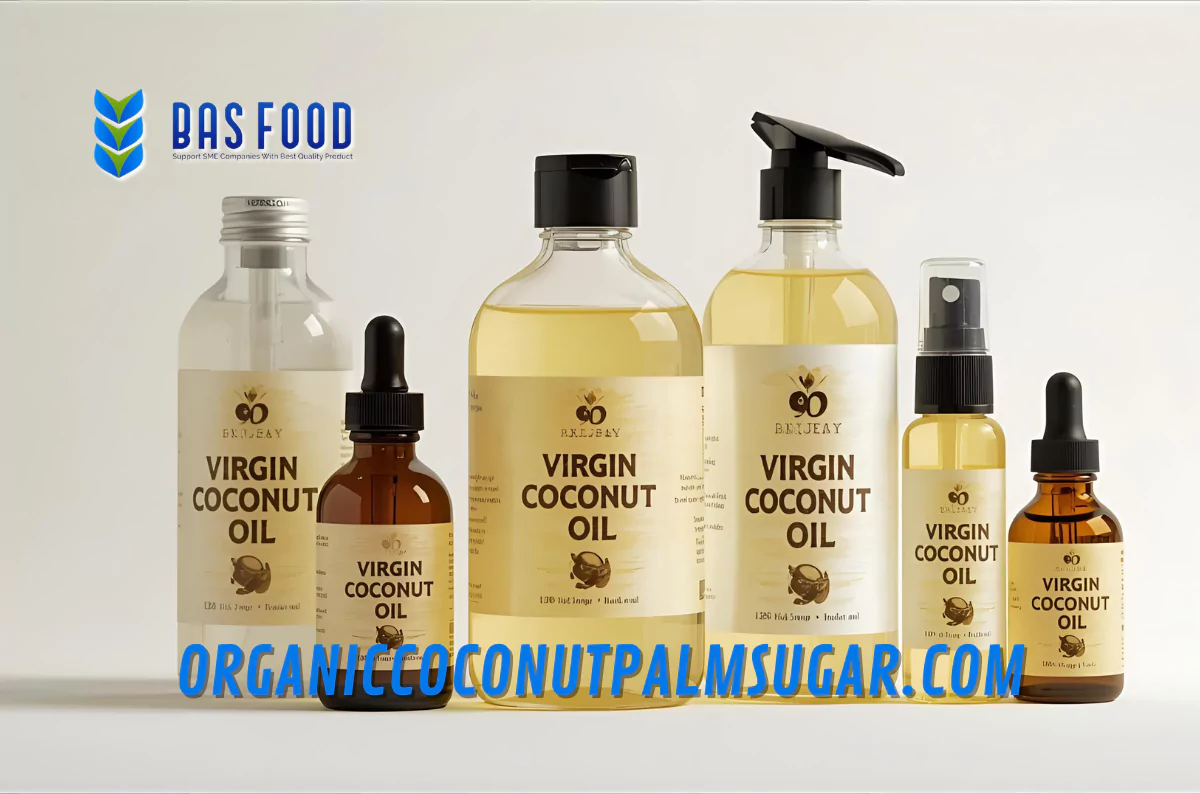Virgin Coconut Oil (VCO) is a product with a worldwide reputation for purity, nutrition, and versatility. However, one key factor often overlooked in its journey from farm to consumer is VCO packaging. The way coconut oil is stored, bottled, and shipped makes a huge difference in its shelf life, quality, and market appeal.
Packaging does not just protect the oil; it tells a story. From stylish bottled VCO on supermarket shelves to coconut oil bulk packaging for factories and exporters, packaging influences how people perceive and value the product. Choosing the right material, design, and format is a balancing act between functionality, safety, and branding.

Evolution of VCO Packaging: From Traditional to Modern
In earlier times, coconut oil was often stored in clay jars, tin cans, or recycled containers. While practical, these methods offered little protection against contamination and oxidation. As global demand for VCO grew, packaging evolved to meet international safety and hygiene standards.
Today, VCO packaging reflects both technology and marketing. Producers now use food-grade glass, PET plastic bottles, and even eco-friendly pouches. Each packaging type caters to a specific audience. For example, small bottles target households, while coconut oil bulk packaging serves industrial buyers and cosmetic manufacturers. This shift highlights how packaging adapts to modern consumer needs.
Bottled VCO: The Face of Retail Markets
When most people think of VCO, they picture crystal-clear oil in neatly labeled bottles. Bottled VCO dominates retail because it is convenient, hygienic, and visually appealing. Glass bottles are often preferred because they protect the oil from chemical leaching and preserve freshness. On the other hand, PET bottles are lightweight and cost-efficient, making them popular in mass markets.
Labels and branding also play an essential role. A good bottle is not just a container; it becomes a communication tool. It provides information about purity, extraction method, and sometimes export-ready coconut oil certifications. This transparency builds consumer trust while enhancing the product’s perceived value.
Coconut Oil Bulk Packaging: Meeting Industrial Demand
While bottled products shine in retail, businesses need something more practical. That is where coconut oil bulk packaging comes in. Bulk formats, such as 5-liter jerry cans, 20-liter pails, or 200-liter drums, are designed for manufacturers who use VCO as a raw ingredient in food, cosmetics, or pharmaceuticals.
Bulk packaging prioritizes efficiency and cost. It reduces handling, minimizes waste, and ensures that large quantities of oil reach buyers in good condition. Exporters often use food-grade HDPE drums or flexi tanks for overseas shipments. This form of VCO packaging ensures that buyers receive high-quality oil without compromising freshness or safety.
Export-Ready Coconut Oil: Packaging Standards for Global Trade
For VCO to compete in the global market, it must be export-ready coconut oil. This means the packaging must meet international standards for food safety, durability, and labeling. Export packaging is not just about aesthetics—it involves strict compliance with regulations from agencies such as the FDA, EU, or Codex Alimentarius.
Export-ready packaging often includes tamper-proof seals, batch numbers, and certifications that guarantee authenticity. For long-distance shipping, packaging materials must also withstand varying temperatures and humidity levels. Without proper VCO packaging, even the highest-quality oil risks spoilage during transit. This makes export packaging one of the most critical aspects of the coconut oil supply chain.
Sustainability in VCO Packaging: A Growing Trend
With rising environmental awareness, sustainable packaging is becoming a key factor in global trade. Consumers now prefer bottled VCO in recyclable glass or biodegradable containers. Eco-conscious companies are experimenting with paper-based labels, compostable caps, and minimalistic designs that reduce waste.
At the bulk level, exporters are looking into reusable drums and refill systems to cut down on plastic. This shift benefits not only the environment but also strengthens brand reputation. Businesses that adopt eco-friendly VCO packaging often gain a competitive edge in markets where sustainability drives consumer decisions.
How Packaging Shapes Consumer Perception
Packaging is not only functional—it shapes how consumers feel about the product. A sleek glass bottle conveys premium quality, while a sturdy drum signals reliability for industrial buyers. On the other hand, poorly designed packaging may raise doubts about safety and authenticity.
Color, typography, and labeling also influence decisions. Consumers are more likely to trust export-ready coconut oil if the packaging includes certifications, nutritional facts, and country of origin. In short, packaging does more than protect—it communicates trust, transparency, and value.
CV Bonafide Anugerah Sentosa: Trusted Supplier for Coconut Oil and Spices
When it comes to sourcing high-quality coconut oil, finding the right supplier matters as much as packaging. CV Bonafide Anugerah Sentosa, an established exporter from Indonesia, has built a reputation for delivering premium coconut products, including VCO, coconut sugar, and other coconut derivatives.
The company also supplies Indonesian spices such as clove, nutmeg, and black pepper, making it a versatile partner for international buyers. With experience in both coconut oil bulk packaging and export-ready coconut oil, CV Bonafide Anugerah Sentosa ensures that clients receive products that meet strict global standards. Their commitment to quality, sustainability, and consistency makes them a trusted name in the industry.
Conclusion: The Future of VCO Packaging
As the global coconut oil market continues to expand, packaging will remain a central factor in its success. From household-friendly bottled VCO to large-scale coconut oil bulk packaging, the right format ensures freshness, safety, and convenience. For international markets, export-ready coconut oil packaging builds trust and compliance, opening doors to wider distribution.
With increasing consumer demand for sustainable options, the future of VCO packaging will likely focus on eco-friendly innovations. Companies like CV Bonafide Anugerah Sentosa are already leading the way, proving that quality packaging and reliable supply chains can go hand in hand.
For consumers, businesses, and exporters alike, packaging is more than a container—it is the silent ambassador of the product itself. Choosing the right VCO packaging is not just good practice; it is a winning strategy for global success.
Contact CV Bonafide Anugerah Sentosa how we can provide the best solutions for you. WhatsApp: +62 8213 4505 737, Email: info@bonafideanugerahsentosa.com / bas.mdir@gmail.com.

